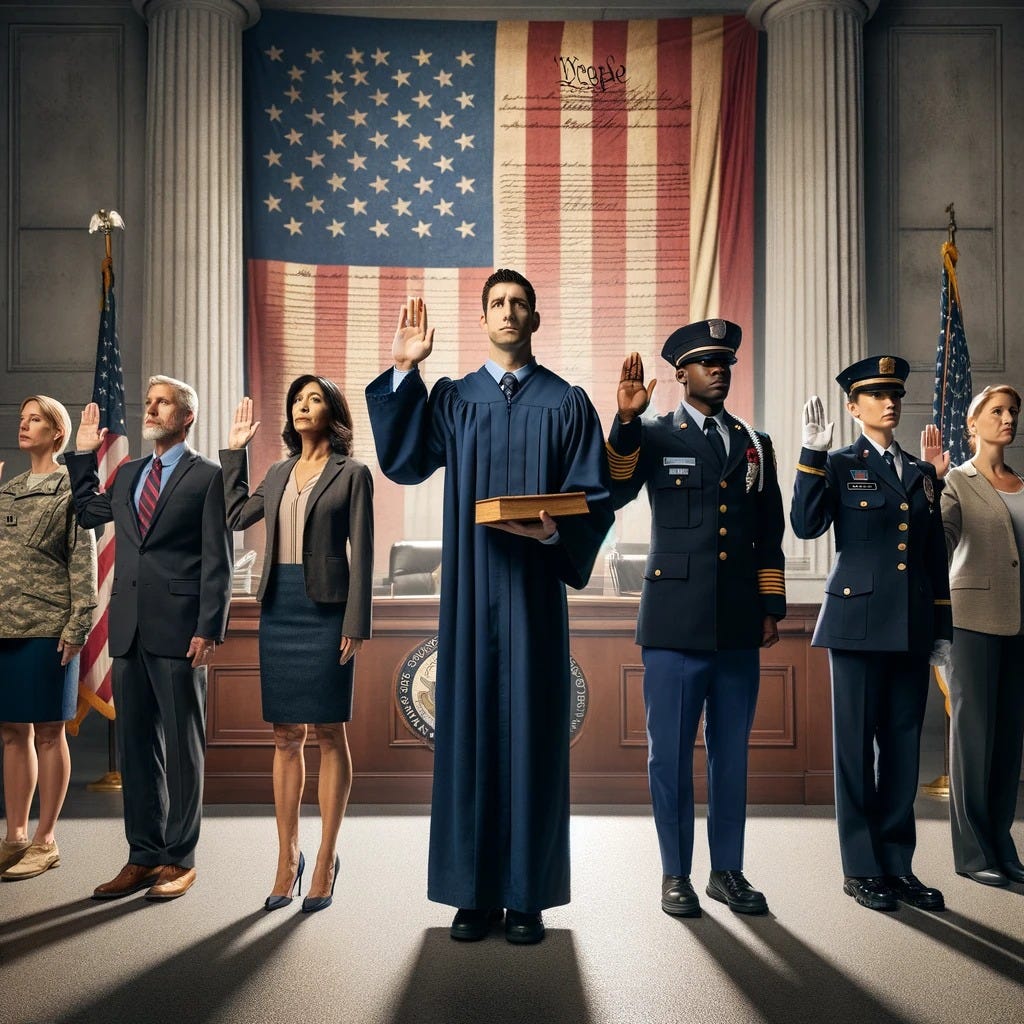✍️ What Every Public Official Swears to Do (And Why It Matters Now)
Too many are forgetting that their highest duty is to the Constitution—not to power.
Every public official—elected or not—swears an oath to uphold the Constitution, not any individual or political party. That message matters even more now.
In recent weeks, we’ve seen disturbing examples of public officials being pressured—or ordered—to violate that oath.
Immigration officers have detained people for social media posts. National Guard units have been deployed to quash peaceful protests under vague “threat assessments.”
Federal funds have been withheld from communities seen as politically disloyal. And whistleblowers across agencies report retaliation for upholding the law rather than partisan directives.
These aren’t just headlines. They’re stress tests for the Constitution.
The oath to support that Constitution is not a formality. It’s a legal and moral commitment that stretches across the public sector—from the president to courthouse clerks, from military officers to municipal planners.
And in moments like this, it becomes more than symbolic.
This isn’t just a warning for insiders. It’s a call for all of us to defend public servants who still honor their oath—and to challenge those who violate it. If you're in public service, this is the moment for which that oath was made. If you’re a citizen, it’s time to stand with those who refuse to betray the Constitution.
The Oath Isn’t Just for Presidents
Most Americans know the president swears an oath to “preserve, protect and defend the Constitution of the United States” (Article II, Section 1). But that duty isn’t just for the president. It’s written directly into the Constitution that all federal and state officials—including senators, judges, governors, military officers, and others—must take a similar oath.
All executive and judicial Officers… shall be bound by Oath or Affirmation, to support this Constitution. — U.S. Constitution, Article VI
That means their highest obligation is to the Constitution—not to a political leader, not to a party, and not even to their boss.
A Promise That Extends Deep into Government
While elected officials are the most visible, they’re not the only ones bound by this duty. The Constitution requires it of all executive and judicial officers. That includes federal appointees, state agency heads, law enforcement leaders, and military commanders.
It also applies to many frontline staff—like U.S. marshals, immigration officers, legal advisors, and others acting under government authority.
Even if some government employees—like I was for 30 years—don’t recall taking a formal oath, many do. But oath or not, they still carry a responsibility to uphold the Constitution in how they do their jobs.
That includes refusing to carry out unlawful or unconstitutional orders.
This Constitution… shall be the supreme Law of the Land.” — Article VI
Obeying Orders Isn’t Always the Right Thing
If someone in government is told to do something that violates the Constitution, their oath isn’t just ceremonial. It means they’re expected to say no.
That might mean speaking up, refusing to act, documenting concerns, or even risking their position. And yes, they could be fired or forced out for doing so.
But that’s not the end of the story. Because the Constitution is the highest law in the land, those who are punished for standing by it may have legal grounds to challenge what was done to them.
They are not lawbreakers—they are defenders of the law itself.
We the People Have a Role, Too
When authoritarian orders are given—or when public servants are punished for refusing them—we need to pay attention.
As I’ve written before, we need to speak out. Because if we stay silent, we’re sending a message that loyalty to power matters more than loyalty to the Constitution.
We can write letters, show up to meetings, call out wrongdoing, and most importantly: stand with those who uphold their oath, especially when it costs them.
The Constitution is only as strong as the people willing to defend it.
That includes the people in office. And it includes you and me.
Related Resources
Advocacy groups working to reform government, protect voting rights, and defend democratic norms.
Step-by-step guides, toolkits, and platforms for effective organizing.
Find your lawmakers, track legislation, make your voice count.




